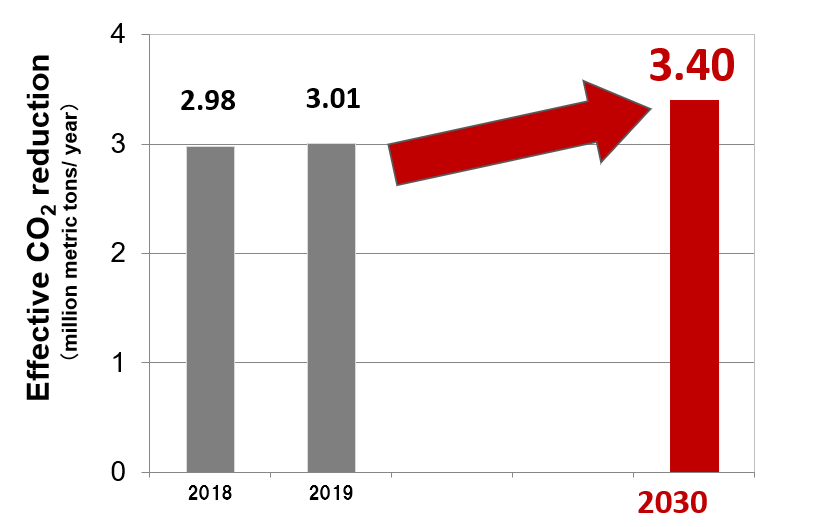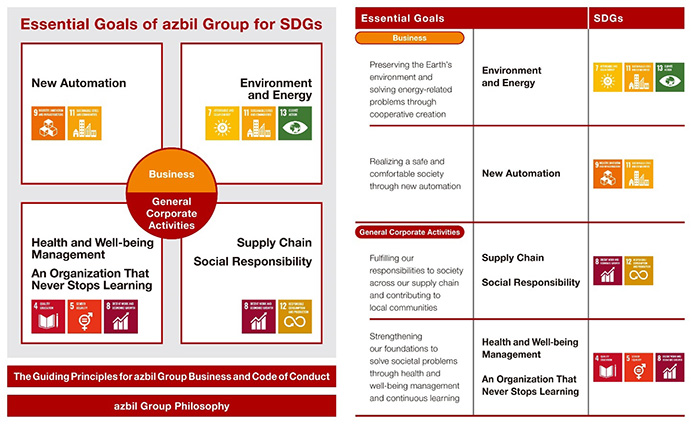The azbil Group Establishes New Numerical Targets for the SDGs
— Contributing “In Series” to a Sustainable Society —
TOKYO, Oct. 2, 2020: Azbil Corporation (Tokyo Stock Exchange Code: 6845) announced it has established two new numerical targets for its “Essential goals of the azbil Group for the SDGs”*1. In pursuit of achieving a sustainable society, the azbil Group has positioned the SDGs as important guideposts for management and announced the “Essential goals of the azbil Group for the SDGs,” four goals covering business and general corporate activities, including human resource development, that aim to create value unique to the azbil Group. The azbil Group established the new numerical targets in order to advance its contributions “in series” to a sustainable society.
The azbil Group assigned the following numerical targets to the goals of Environment and Energy, Health and Well-being Management, and An Organization That Never Stops Learning.
- For Environment and Energy, the azbil Group will contribute to the effective reduction of 3.40 million metric tons of CO2 per year at customers’ sites
- For Health and Well-being Management and An Organization That Never Stops Learning, the azbil Group will set a 65% target for the percentage of employees satisfied working for the azbil Group as well as the percentage of employees who felt personal growth through their job in the past year.
For Environment and Energy, the azbil Group is striving to further reduce greenhouse gas emissions at customers’ sites and established a numerical target of 3.40 million metric tons per year for contributing to the effective reduction of CO2 emissions. The azbil Group has announced its effective CO2 reduction levels in the past but moving forward, the Group will use this new target, which is to be achieved in FY2030, as an important method of gauging continued contributions to the SDGs. An effective CO2 reduction of 3.40 million metric tons per year at customers’ sites will be equivalent to approximately 1/300 of all CO2 emissions in Japan (approx. 1.04 billion metric tons of CO2) for that fiscal year*2 and is an ambitious target when compared with the 3.01 million tons achieved in FY2019. The azbil Group will continue to reduce CO2 emissions through business activities at customers’ sites.

For Health and Well-being Management, the azbil Group, while continuing to support employees’ physical and mental well-being, announced its Health and Well-being Declaration in 2019 to proactively bring happiness to employees. Furthermore, the Group advanced initiatives such as reducing total work hours, eliminating harassment, and furthering diversity and inclusion. In order to create workplaces that are healthy, happy, and lively, the Group surveys its employees every year on job satisfaction and has set a numerical target of 65% for the percentage of employees satisfied working for the azbil Group. In developing and strengthening the goal of An Organization That Never Stops Learning, the Group will strengthen foundations for tackling social issues through continual learning and continue to create an environment in which employees can learn and grow through working. To that end, the Group set a numerical target of 65% for the percentage of employees who felt personal growth through their job, which is another question in the annual survey.
Based on the Group philosophy of “human-centered automation,” the azbil Group will strive to contribute “in series” to a sustainable society and achieve sustained growth. With the establishment of the new numerical targets, the Group will move forward with specific initiatives to achieve them.
*1 The Essential Goals of the azbil Group to achieve the SDGs are divided into four categories. The first two are undertaken by business activities while the latter two by general corporate activities.
(1) Environment and Energy
(2) New Automation
(3) Supply Chain; Social Responsibility
(4) Health and Well-being Management; An Organization That Never Stops Learning

Essential Goals of azbil Group for SDGs
*2 Based on projections by Japan’s Ministry of Environment.
https://www.env.go.jp/en/earth/cc/2030indc.html
* Posted information is accurate as of the date of announcement.
